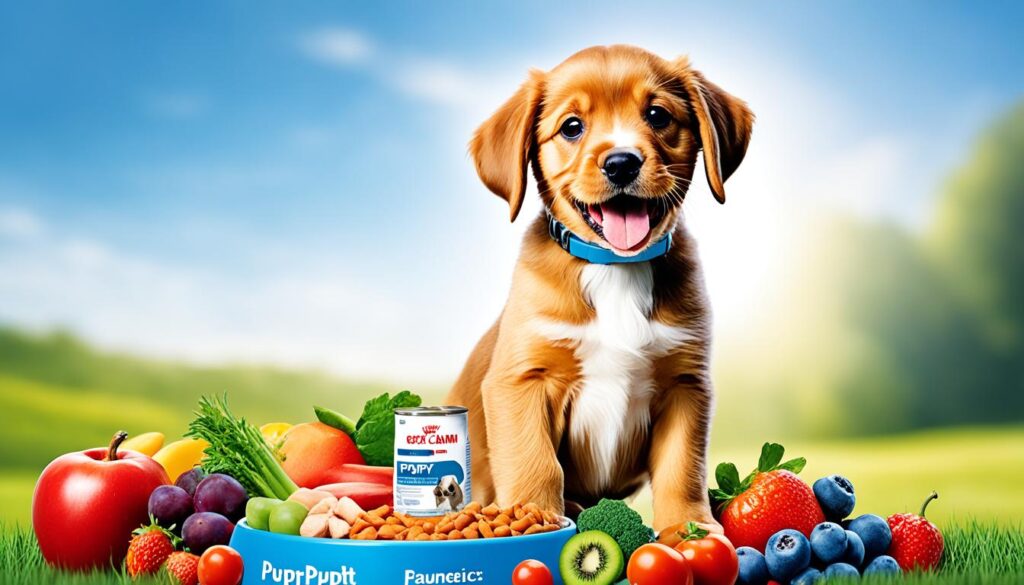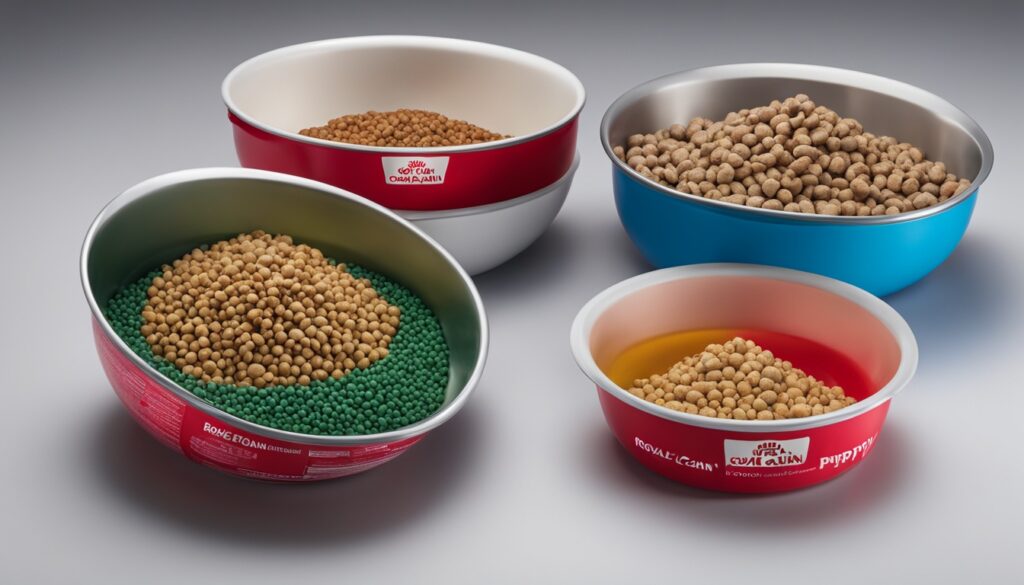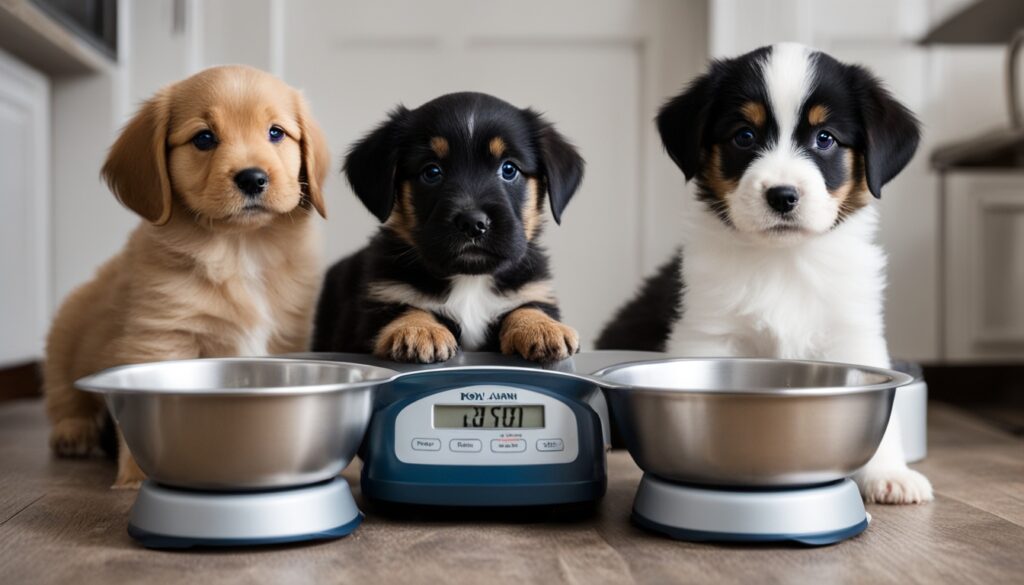Did you know the right diet for puppies depends on their adult size? Puppies need different foods based on their breed size. Whether your puppy is small and grows fast or is a giant breed that takes longer, knowing what they need is key.
Royal Canin dog food is made to meet puppies’ specific needs. It helps them grow and stay healthy. Starting with small meals often and then reducing them helps avoid stomach problems.
Using the same bowl and spot for meals helps puppies feel secure. This, along with a gradual diet change, eases their digestion. Royal Canin dog food ensures puppies get the nutrition they need for healthy growth.
Key Takeaways
- Puppy diet recommendations are based on their future adult size—x-small, small, medium, large, or giant breeds.
- Transition times to adult food vary: up to eight months for smaller breeds, up to two years for larger breeds.
- Feeding small, frequent meals helps prevent digestive problems and promotes balanced growth.
- Royal Canin dog food offers nutrition tailored to a puppy’s breed size and can prevent issues like skeletal problems in large breed dogs.
- Establishing consistent feeding routines and locations supports positive eating habits and optimal health.
The Importance of Breed-Specific Puppy Food
It’s key for pet owners to understand the role of breed-specific puppy food. Different breeds have unique traits, like jaw strength and growth rates. This means puppies need food that fits their specific needs for the best growth.
Why Breed Matters in Puppy Nutrition
Breed plays a big part in a puppy’s diet. Breed-specific foods meet the varied needs of different breeds. For example, Golden Retrievers need Omega 3 and Omega 6 fatty acids for healthy skin and coat.
Small breeds get kibble that helps with chewing and dental health. This is because of their jaw type and how they bite.
- Chondroitin and glucosamine in Dachshund food promote healthy bones and joints.
- Highly digestible proteins and specific fibers in German Shepherd diets aid digestion.
- Specific amino acids and fatty acids from borage oil and flax seeds in West Highland Terrier food maintain skin health.
Unique Needs of Different Breeds
Each breed has its own diet needs that breed-specific puppy food can meet. Active breeds need lots of energy for play. Large breeds like Rottweilers must eat carefully to avoid fast growth and bone problems.
Food for Rottweilers includes chondroitin and glucosamine for healthy bones and joints. It also helps keep them at a healthy weight.
| Breed | Key Ingredients | Benefits |
|---|---|---|
| Dachshund | Chondroitin, Glucosamine | Promotes healthy bones and joints |
| Golden Retriever | Omega 3 & 6 fatty acids | Supports skin health and coat vitality |
| West Highland Terrier | Specific amino acids, Borage oil, Flax seeds | Maintains skin health |
| German Shepherd | Highly digestible proteins, Specific fibers | Aids digestion |
| Rottweiler | Chondroitin, Glucosamine | Supports bones and joints, maintains weight |
Some vets say breed-specific puppy food is key, especially for large breeds. It helps with their growth and health. These foods are made to fit each breed’s needs, balancing nutrition and growth for their future health.
Choosing the Best Puppy Food for Growth
When picking puppy food, think about your dog’s future size and life stage. High-quality puppy food that matches your puppy’s growth needs is key. It gives them the right nutrients for a strong immune system and good digestion.
“For large- and giant-breed puppies expected to weigh over 50 pounds as adults, it is advisable to use a puppy food specially formulated for large- or giant-breed dogs to prevent excessive growth.”
Breed-specific dog foods have special benefits. For example, small and X-small dogs need food that fits their jaws and teeth. Large and giant breeds need food that helps them grow right and keeps their teeth clean. Picking the right puppy food helps your puppy grow healthy and avoids problems like bad teeth and bones.
- Small dogs need more calorie-dense foods to keep up their energy and health.
- Large and giant breeds eat fewer calories and less calcium to grow muscles and bones right.
- Wet foods are more tempting for picky eaters because of their taste and smell.
- Dry food is cheaper and easier to keep, helping to fight dental problems and gum disease.
It’s important to choose high-quality puppy food from a trusted brand. These brands do scientific research and feeding trials to make sure their food is as labeled. When it’s time to switch to adult dog food, do it when your puppy is about 80% of their adult size.
Groups like the US FDA and vet journals keep studying diet and health issues. It’s good to look at the World Small Animal Veterinary Association’s advice when picking pet food. The AAFCO says “complete” means the food has all needed nutrients, and “balanced” means the nutrients are in the right amounts.
Choosing between wet and dry food depends on what your puppy needs and likes. Both have their good points, so knowing what your puppy needs helps you decide.
- Figure out your puppy’s breed size.
- Talk to a vet to find out what nutrients your puppy needs.
- Pick a high-quality puppy food from a trusted brand.
- Watch and change food amounts as your puppy grows.
- Switch to adult food when your puppy is about 80% of their adult size.
Key Nutrients in High-Quality Puppy Food
High-quality puppy food is packed with key nutrients vital for growth and development. These nutrients are balanced to support a puppy’s health. They help with physical growth and keep the puppy full of energy.
Proteins and Amino Acids
Proteins are key in puppy food as they help build muscles and support growth. Amino acids, from proteins, are important for fixing tissues, building muscles, and helping with metabolism. Royal Canin Breed Health Nutrition Puppy Dog Food has about 31.4% protein, making sure puppies get enough protein.
Essential Vitamins and Minerals
Along with proteins, vitamins and minerals are crucial for a strong immune system and metabolism. Vitamins A, D, and E, and minerals like calcium and phosphorus, help with bones, eyes, and skin health. Foods from Royal Canin and Hill’s Science Diet have the right amount of these nutrients, so puppies don’t need extra supplements.
| Brand | Product | Calories per Cup |
|---|---|---|
| Hill’s Science Diet | Puppy Small Bites Dry Dog Food | 393 kcal |
| IAMS | Proactive Health Smart Puppy Dry Dog Food | 380 kcal |
| Purina Pro Plan | Development Puppy Chicken & Rice Canned Dog Food | 475 kcal per can |
| Royal Canin | Small Puppy Dry Dog Food | 349 kcal |
| Purina Pro Plan | Large Breed Dry Puppy Food | Supports brain and visual health |
Thinking about these factors helps make sure your puppy gets the right nutrition. This supports healthy growth and well-being for a long time.
Feeding Schedule and Portion Control
A proper feeding schedule for puppies and puppy portion control are key to puppy care. Feeding them at the same time every day helps their digestion and prevents issues like diarrhea. This is because their stomachs are small and can’t handle too much food.
Establishing a Feeding Routine
Start a feeding routine early, adjusting as your puppy grows. Puppies need four meals a day when they are weaning. Then, switch to three meals a day for small breeds up to four months or six months for large breeds.
For small breeds, two meals a day are enough between four to ten months. Large breeds can wait until six to twelve months for this change. Sticking to a routine helps their digestion and metabolism stay healthy.
Adjusting Portions as Your Puppy Grows
It’s important to watch and adjust the food amounts as your puppy gets bigger. Each stage of growth needs different nutrients. Puppy food with more energy is important during fast growth periods.
The table below shows how to feed your puppy at each growth stage.
| Growth Stage | Feeding Frequency | Notes |
|---|---|---|
| Weaning (All sizes) | Four meals a day | Rapid growth phase, higher energy-density food required |
| Up to 4 months (Small breeds) or 6 months (Large breeds) | Three meals a day | Gradual increase in meal portions |
| 4 to 10 months (Small breeds) or 6 to 12 months (Large breeds) | Two meals a day | Balanced meals to avoid quick growth and skeletal issues |
Following a specific feeding schedule for puppies helps them grow well. Too much food can make them gain weight too fast, especially in large breeds. It’s important to control food amounts. When switching to adult dog food, do it slowly and carefully to avoid stomach problems.
Royal Canin Puppy Food: A Comprehensive Review
Royal Canin puppy food is a top choice for pet owners. It offers balanced nutrition for different breeds and sizes. This food is made to meet the unique needs of growing puppies.
The Royal Canin Mini Puppy line has a 3-star rating. It includes two dry dog foods. These foods are packed with 32.8% protein, 20.6% fat, and 38.6% carbohydrates. These nutrients are key for a puppy’s growth and development.
Chicken meal, brewers rice, and chicken fat are main ingredients. They are joined by corn, corn gluten meal, wheat gluten, and dried beet pulp. The food has about 30% protein, 19% fat, and 39% carbohydrates.
For nearly 50 years, Royal Canin has been researching and perfecting their products. They focus on immune health and digestion with prebiotics and digestible proteins. This approach helps puppies grow strong and healthy.
| Nutrient | Content |
|---|---|
| Protein | 31.0% |
| Fat | 20.0% |
| Fiber | 1.4% |
| Ash | 8.0% |
| Moisture | 8.0% |
| Omega-3 | 0.17% |
| Calories | 407 kcal per 100g |
Royal Canin meets the nutritional needs at different life stages. This helps puppies grow right, stay healthy, and avoid common health problems. It uses both plant and animal proteins for a balanced diet. This is great for small breed puppies from 2 to 10 months old, weighing 4-10 kg.
Also, Royal Canin is very popular, with 480,480 views in the last 30 days. This shows how well the brand is doing. It’s a top choice for pet owners who want the best for their puppies.
Why Puppy Food for Small Breeds Differs from Large Breeds
Puppy food for small breeds is different from that for large breeds. This is because they have unique nutritional needs. These needs come from their jaw strength, teeth size, and how they grow. Getting the right food helps them grow healthy.
Small breed dogs need more calories to keep up with their fast metabolism and small jaws. It’s important to control how much they eat to prevent weight gain. Food for small breeds is made to be smaller, which helps with digestion and dental health. Large breed dogs, on the other hand, need puppy food with the right amount of calcium for bone growth. High-quality food for large breeds is made to be less calorie-dense. This helps with steady bone and joint growth and avoids growth problems.
- Smaller kibble size for small breeds
- Portion control for preventing weight gain in small breeds
- Calcium-rich food for large breeds
- Less energy-dense diets for steady growth in large breeds
Large breed dogs often face joint problems. Foods with glucosamine, fiber, and prebiotics can help with joint health and digestion. It’s key to give your puppy the right nutrition for a good start in life. By following these tips, your puppy, big or small, will grow into a healthy adult dog.
Transitioning Your Puppy to Adult Food
Switching your puppy to adult food is a big step in their diet. It’s important to know when it’s time for this change. Look for signs like reaching their adult size to make the switch. Smaller breeds grow faster and need different nutrients at different stages.
Signs It’s Time to Transition
Knowing when to change your puppy’s food helps them grow and develop well. Here are some signs to watch for:
- Reaching adult size: Small breeds mature around 10-12 months, medium breeds between 12-15 months, and large breeds may take 15-24 months.
- Reduction in calorie needs: After spaying or neutering, puppies may need fewer calories — check with your vet for advice.
- Monitoring growth: Regular vet check-ups help make sure your puppy’s muscles and bones are growing right.
Step-by-Step Transition Process
It’s important to switch your puppy’s food slowly to avoid stomach problems. A gradual change over a week is best:
- Day One: Mix 25% adult dog food with 75% puppy food.
- Day Three: Use a 50/50 mix of new adult food and puppy food.
- Day Five: Add 75% adult dog food and 25% puppy food.
- Day Seven: Feed 100% adult dog food.
Watch your puppy’s behavior and how much they eat during the switch. If they act sick or vomit, be patient and careful. Feeding the new diet for two months lets your pet fully adjust. If you’re changing food for health reasons, check in with your vet often to see how they’re doing.
| Stage | Small Breeds | Medium Breeds | Large Breeds |
|---|---|---|---|
| Reaching Adult Size | 10-12 months | 12-15 months | 15-24 months |
| Specialized Diet Needs | High protein and fat | Balanced nutrient mix | Specialized puppy food like Maxi Puppy by Royal Canin |
Conclusion
Feeding puppies the right food is key to their growth and health. Royal Canin offers special food for puppies at different stages, like newborns, weaning, and growing ones. They make food for various breeds, knowing each has its own needs.
Proteins and amino acids are vital for muscle and bone growth. Minerals like calcium and phosphorus are important for strong bones. Fat gives puppies lots of energy, making it a key part of their diet.
Royal Canin’s food helps puppies grow strong in many ways. It supports their brains, muscles, organs, and stomachs. This helps puppies grow well.
Royal Canin also helps puppies’ minds. Puppies eating food rich in DHA think better, showing how important Royal Canin is for their development. With a 4.8 rating from 2252 reviews, it’s clear many pet owners trust Royal Canin. Choosing Royal Canin can help your puppy live a long, healthy life.


